December 1, 2021, 12:00 – 1:30pm ET
Paper presentation: From movements to cause fields: Rethinking the architecture of protest in the context of movement institutionalization
Laure Bereni, Centre Maurice Halbwachs, Paris
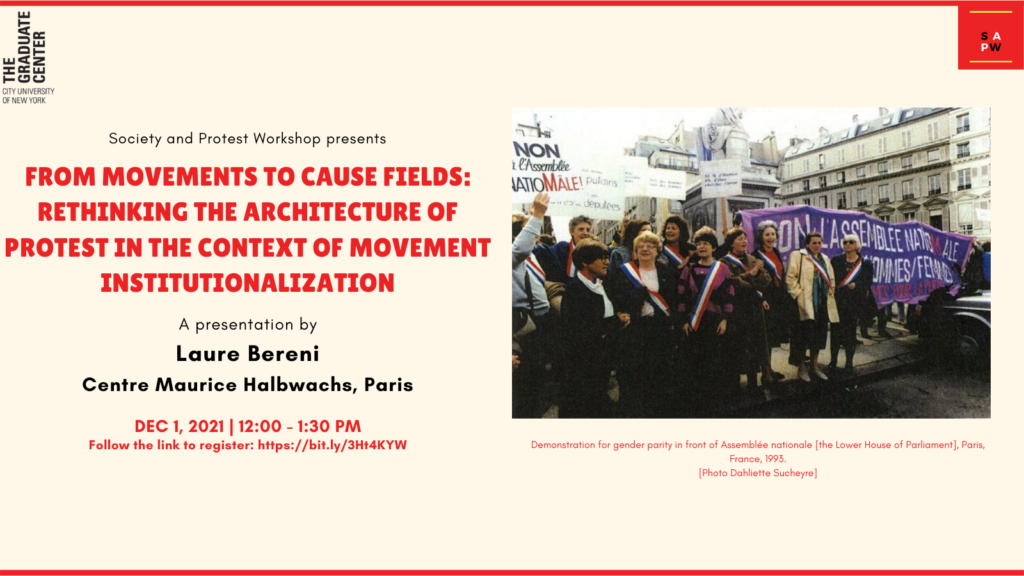
Register at the link to receive the Zoom details for the meeting: https://bit.ly/3Ht4KYW
Summary:
The women’s cause in a field: rethinking the architecture of collective protest in the era of movement institutionalization
“This article introduces the concept of women’s cause field, which refers to the relational structure of groups mostly devoted to the advancement of women in a variety of social settings, cutting across the line between civil society and political institutions. Unlike the women’s movement, the women’s cause field encompasses a set of both extra-institutional and intra-institutional mobilizing structures. This concept expands on scholarship on institutional activism, and on field and network theory. Beyond the case of the women’s movement, it provides a new framework – the notion of cause field – to capture the architecture of specialized collective protest in the era of movement institutionalization, distinct from, and complementary to, the concept of social movement.”
Author:
Laure Bereni is CNRS Research Director (permanent research professor) in sociology, and a faculty member of the Centre Maurice Halbwachs – a research center affiliated with the École des Hautes Études en Sciences Sociales (EHESS) and the École Normale Supérieure (ENS) in Paris. In 2021-22, she is Visiting Scholar at the Graduate Center, City University of New York. Her research interests lie at the intersection of political sociology, the sociology of gender and race, and the sociology of work and organizations. Her doctoral research focused on the movement for gender parity in France (La bataille de la parité [The Battle for gender parity], Paris, Economica, 2015). Based on her reflection on this case, she introduced the concept of women’s cause field (espace de la cause des femmes). Over the past few years, she has been working on corporate diversity initiatives in the U.S. and France, with a focus on the dynamics of organizational legitimization. She is leading a new collective research project (ProVirCap) on “responsible capitalism” in three business areas: New York, Paris and Madrid. She recently published « The Women’s Cause in a Field. Rethinking the Architecture of Collective Protest in the Era of Movement Institutionalization » (Social Movement studies, 2021) and « Au-delà de la confrontation : saisir la diversité des interactions entre mondes militants et mondes économiques » [Beyond confrontation: Capturing the diversity of interactions between activist worlds and economic worlds] (Revue française de sociologie, 2021) [with S. Dubuisson-Quellier].
Discussant:
Zachariah Mampilly is the Marxe Endowed Chair of International Affairs at the Marxe School of Public and International Affairs [marxe.baruch.cuny.edu], CUNY and a member of the doctoral faculty in the Department of Political Science at the Graduate Center, CUNY. He is the Co-Founder of the Program on African Social Research [pasiri.org]. He is the author of Rebel Rulers: Insurgent Governance and Civilian Life during War [cornellpress.cornell.edu] (Cornell U. Press 2011) and with Adam Branch, Africa Uprising: Popular Protest and Political Change [amazon.com] (African Arguments, Zed Press 2015). He is the co-editor of Rebel Governance in Civil Wars [cambridge.org] (Cambridge U. Press 2015) with Ana Arjona and Nelson Kasfir; and Peacemaking: From Practice to Theory [abc-clio.com] (Praeger 2011) with Andrea Bartoli and Susan Allen Nan. His writing has also appeared in Foreign Affairs, Jacobin, The Hindu, Africa’s a Country, N+1, Dissent, Al Jazeera, The Washington Post and elsewhere. He has held fellowships with the Institute for Advanced Study (New Jersey), the Open Society Foundation, the Harry Frank Guggenheim Foundation, the United States Holocaust Memorial Museum and the Fulbright Program.
Register at the link to receive the Zoom details for the meeting: https://bit.ly/3Ht4KYW
November 17, 2021, 12:00 – 1:30pm ET:
Panel discussion: Outside-in: Political Strategies In the Face of Exclusion
Andrés Besserer Rayas, CUNY Graduate Center
&
Eglė Šumskienė, Vilnius University
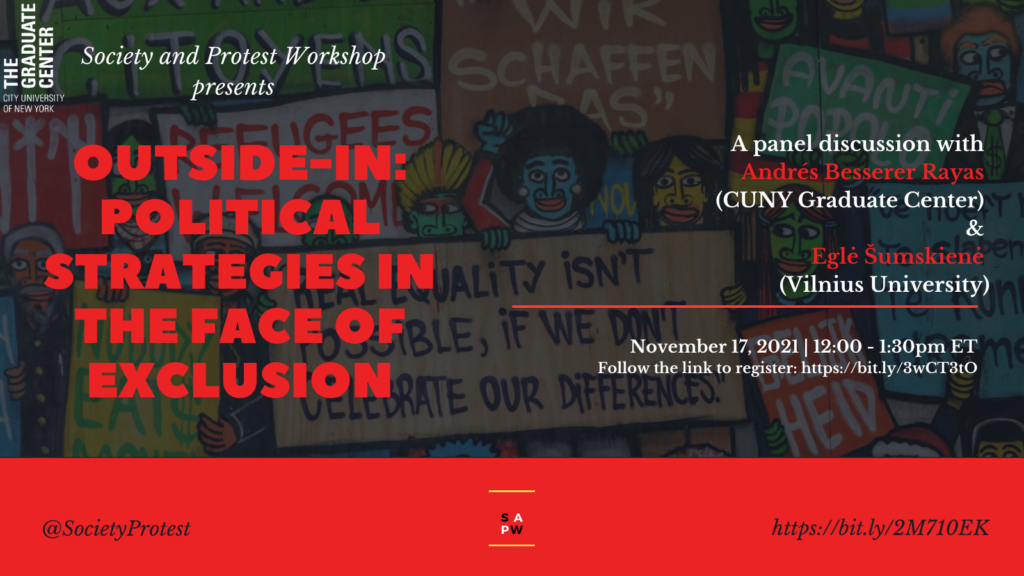
Summary:
What are the strategic implications of mobilizing stigmatized groups and groups with only partial status in a polity? What options are available to people whose very participation in public life is contested? Join us to discuss reports on two pieces of research—one on DACA and “semi-citizenship” and one on mental health movements in post-Soviet societies—to explore these critical questions.
Panelists:
Andrés Besserer Rayas is a PhD student in political science at CUNY’s Graduate Center where he researches issues of immigrant exclusion and has published and presented on citizenship and exclusionary policies towards undocumented immigrants. He is the recipient of a Fulbright Fellowship. Before starting his PhD studies, Andrés studied a master’s degree in Democracy and Comparative Politics at UCL and worked in electoral organization in Mexico. He is a teaching fellow at City College where he has taught courses in comparative politics and on immigration.
Egle Sumskiene is a social worker, sociologist, and expert on disability, mental health, and human rights issues. She completed her Ph.D. on the topic “From traditional to modern care: the case of persons with psychosocial disabilities”. Since 2002 E. Sumskiene works for Vilnius University Social Work and Social welfare department as a lecturer, in 2012 she took the position of associated professor. E. Sumskiene is actively working with the Lithuanian NGO sector, focusing on mental health and human rights. During this period as an expert, she was involved in various international and national projects focusing on such areas as human rights and disability, employment, discrimination, mental health care, policy, social integration of people with psychosocial disabilities. She is editor of one monograph and author of over 30 scientific publications covering issues of human rights and mental health.
Discussant:
Rebecca Krisel is a PhD candidate in political science at the CUNY Graduate. Her research is focused on how social movements formed around taboo issues use digital communication tools to influence the policy process.
Moderator
John Krinsky, City University of New York
Register at the link to receive the Zoom details for the meeting: https://bit.ly/3wCT3tO
October 20, 2021, 12-1:30 pm ET:
Strategies and Symbols of Contentious Politics in Central Asia
Colleen Wood, Columbia University
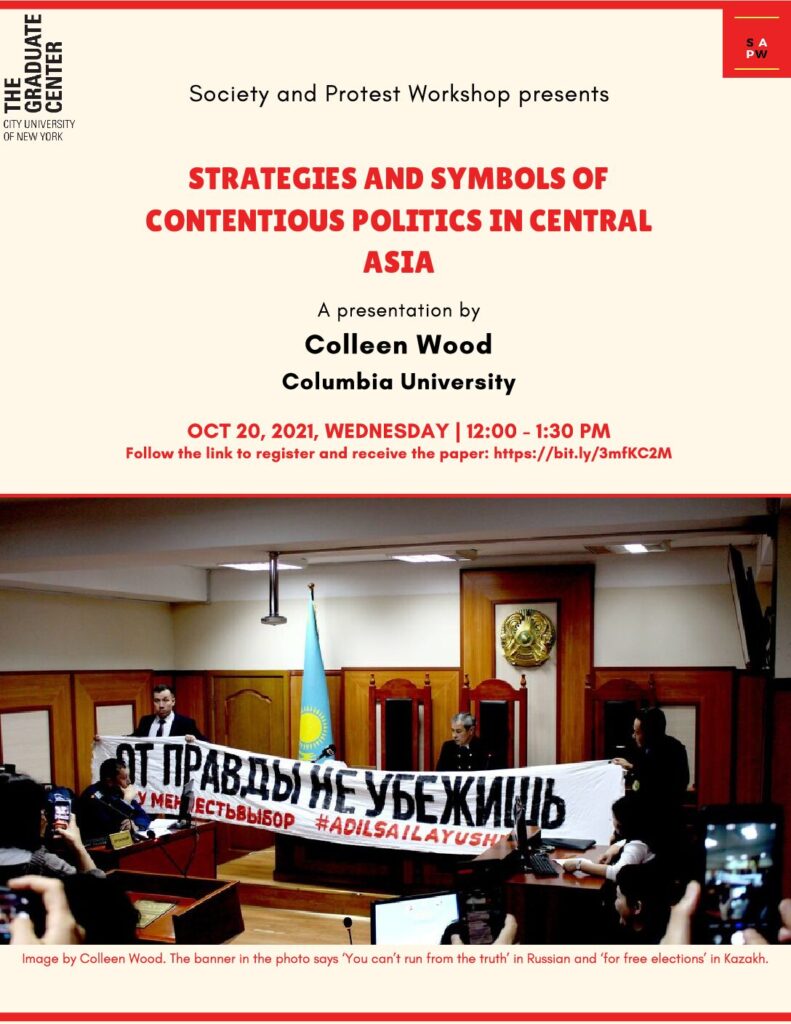
Abstract: Why do some civil society organizations choose to mobilize within the state, while others work outside it? How do groups make sense of the different institutional channels for communicating grievances and advancing rights claims? Empirically, I triangulate data collected over 18 months of digital fieldwork including visual analysis of social media data, digital participant observation, and semi-structured interviews to compare the strategies and discourse of civil society organizations in Kyrgyzstan and Kazakhstan. I find that groups in Kyrgyzstan tend to mobilize outside state-sponsored channels, while groups in Kazakhstan dedicated to political rights have gone through government institutions to make rights claims. The theory I develop explains that this variation is partially driven by top-down legislative context: in highly consolidated regimes, we see more mobilization through formal channels because stronger states can afford to enforce regulations on associational life. To understand variation within each case, I distinguish between consent and compliance in order to give careful attention to how activists devise strategies for making rights claims. I take an inductive approach to analyze the debates and arguments among civil society organizations and social movements in each country and find that different understandings of legitimacy and theories of political change are at the root of tactical and discursive differences.
About the author
Colleen Wood is a PhD candidate at Columbia University’s Political Science Department. Her research on civic identity and political participation in autocracies is funded by the National Science Foundation.
About the discussant
Zitian Sun is a graduate student at the Department of Politics, New York University. His main research focuses are states’ repression tactics, organizations in contentious politics, and radicalization dynamics in social movements, with a regional focus in East Asia.
Register at the link to receive the paper and the Zoom details for the meeting: https://bit.ly/3mfKC2M
Our Fall ’21 Schedule
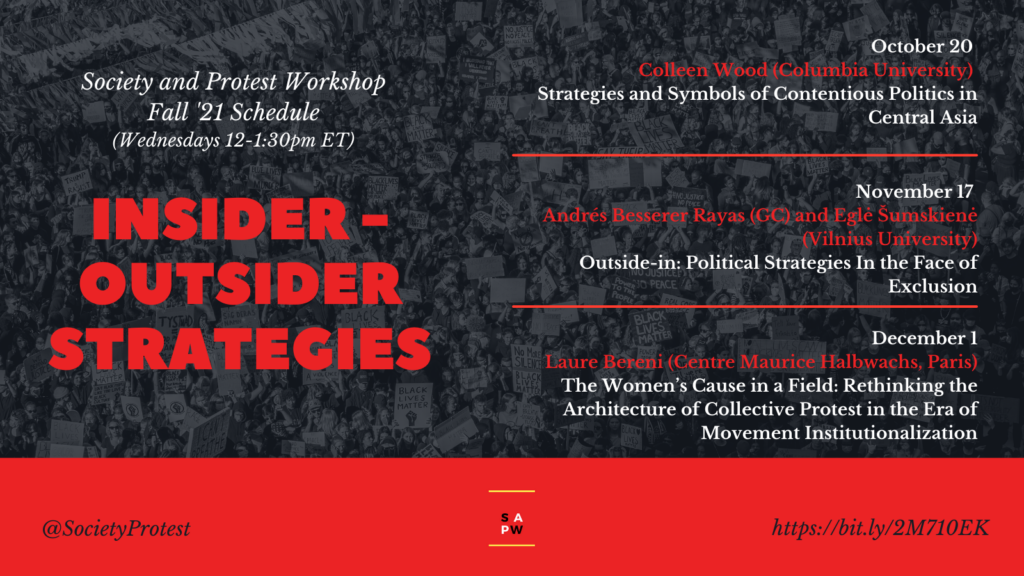
Save the Dates
Our workshops this F’21 semester are scheduled on the following Wednesdays from 12 – 1:30pm ET: 10/20, 11/17, and 12/1.
On 10/20 (12 – 1:30pm ET): Colleen Wood (Ph.D. candidate, Columbia University) will present her dissertation research on Strategies and Symbols of Contentious Politics in Central Asia.
Stay tuned for more details about our upcoming workshop sessions!
Call for Participation
***We are no longer accepting submissions for the Fall ’21 semester. Please check back at the start of the Spring ’22 semester for our new call***
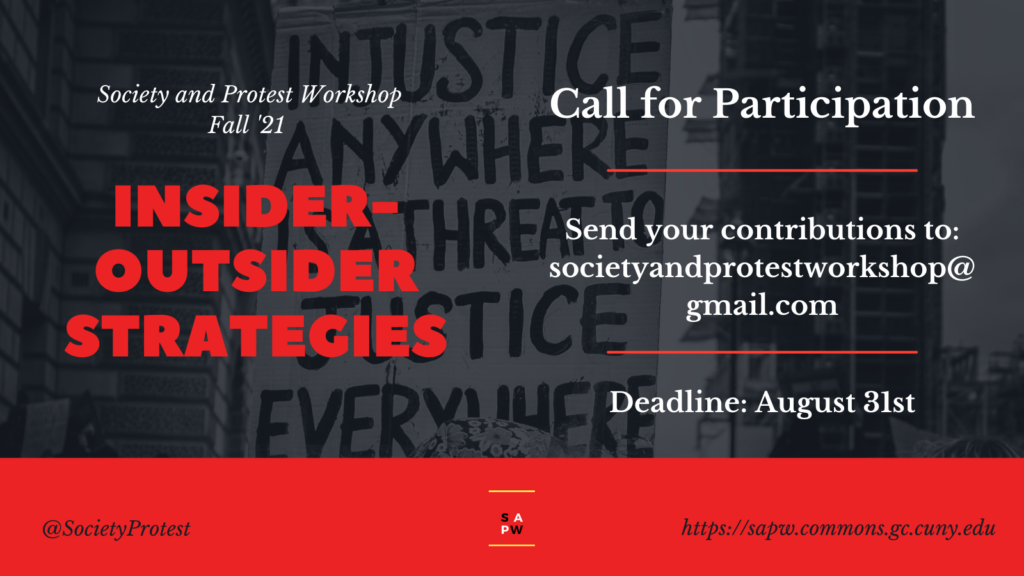
The Society and Protest Workshop at the Graduate Center, CUNY, is planning four meetings in the Fall semester, 2021, on the theme of insider and outsider strategies. We are soliciting proposals for presentations and papers that address the theme, including questions such as:
- Questioning insider/outsider distinctions in models of the polity
- Activist decision-making about how to engage people in power
- What does it mean to have an “insider” strategy for movements? Inside of what?
- Can cooptation be avoided? How?
- What larger political conditions facilitate effective insider-outsider strategies? What conditions inhibit them?
- Can insider-outsider strategies be stable, or do they lead to coalitional or organizational fracture?
- How do insider-outsider strategies differ from each other, or present different sets of dilemmas or choices to activists?
- Do insider-outsider strategies professionalize movements? Do they rely on already-professionalized movements?
- At what point do both/and insider-outsider strategies revert to either/or strategies?
To ask these questions is to get to the heart of the reformist perspectives that inform much of the scholarship on social movements, but also raise questions about the possibility of “non-reformist reforms” and the stability of strategic plurality within movements. Yet, if at least some movements seek to get people “in the door” when they normally have been shut out of decision-making made about them–but not with them–it is also the case that the metaphorical door is rarely flung wide open: a movement is likely to get a foot, or a finger, in the door at first, and the questions and dilemmas we can discuss this semester, nearly inevitably follow.
The Society and Protest Workshop was founded from the joining of two, longer-running existing workshops, the Civil Society Workshop and the Politics and Protest Workshop. Like their predecessors, they are interdisciplinary workshops that welcome contributions from students and faculty, as well as interested people not affiliated with the university, and they are open to all.
We welcome papers and proposals-in-progress that the author would like to workshop, as well as more finished projects and lectures. The format will always include at least one discussant and ample time for participation among workshop attendees. All sessions will be conducted online via Zoom. We hope to explore the possibility of publication for our contributors at the conclusion of each themed semester.
If you are interested in contributing, please submit a paragraph abstract as well as your choice of format (paper and presentation). Presentations should not be more than 25 minutes, with 1 hour available for discussion. Papers not to exceed 8000 words and will be shared the Friday before the week of the session.
Send your contributions to [email protected] no later than Tuesday, August 31.
If you are a Graduate Center student or faculty member interested in being involved in the steering committee of the Society and Protest Workshop, please also drop us a line at [email protected]


